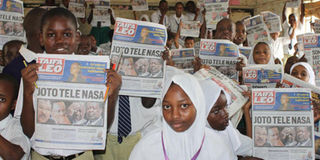Women need mentorship, not affirmative action on op-eds

Sacred Heart Primary School, Mombasa County, pupils display Taifa Leo newspaper on March 22, 2017, which is being used to promote Kiswahili language. More women writers need to be mentored. PHOTO | WACHIRA MWANGI | NATION MEDIA GROUP
What you need to know:
- Roselyne says she has observed that unknown individuals rarely get the opportunity to voice their opinions.
- Underlying most of the readers’ comments are two proposals for increasing the number of women op-ed writers: Affirmative action and mentorship.
Whatever reasons that may exist to explain the shortage of women writers on the Nation’s op-ed pages, shortage of women would-be writers is not one of them.
I know this from the number of women who have written to say how they have been frustrated while trying to write for the Nation.
Nancy Wacinga, for example, who says she is well-versed in climate change, states that she wrote an op-ed about the subject but it was not used.
“No feedback, nothing," she says. Equally, Susan Mugwe says she has been submitting articles on political economy but none of them has been published.
Roselyne says she has observed that unknown individuals rarely get the opportunity to voice their opinions.
“I would like to participate more, contributing articles regularly; what I need is an opportunity to do so. I have tried to get on board, I have not yet succeeded.”
Another reader, a male who does not want his name revealed, says that for every article published he loses about three others that are never published.
“I recall once we had a small quarrel with Andrew Ngwiri, then editing opinion pages, and he arrogantly told me that he used to have more than 15 articles to choose from any given day.”
“This sort of oversupply creates very stiff competition for space. Which is good as it can push standards high. However, it also makes editors extremely arrogant and insensitive and never ever ready to groom writers.
"That lady who wrote to you, for instance, wanted to be groomed, to be tutored, to be encouraged, moulded, et cetera, but editors have no time for that and in any case they are not short of materials.
"I have always found it very frustrating why it is so hard to reach editors and discuss materials with them before writing or before publication. And when articles are rejected, no editor bothers to explain how your work has failed to meet their publication criteria, et cetera.”
MENTOR WRITERS
The reader also says he recently had a small article published in the literary pages of the Saturday Nation.
“I was very happy with the editor. For as long as I have contributed to the Nation for over 15 years, no editor has ever shared with me his edited version of my article and to ask me if I have any strong objection to any editings or alterations.
"Ng’ang’a Mbugua was the first and I felt very honoured. But there are many cases where great writers are lost because they give up after submitting a few articles and not getting published. Of course, I do appreciate that newsrooms are busy and hectic.
"Again, I don’t expect editors to be there to babysit contributors, especially when they have an alternative.”
Underlying most of the readers’ comments are two proposals for increasing the number of women op-ed writers: Affirmative action and mentorship.
One reader who wants to be anonymous is, however, opposed to affirmative action.
He argues, and rightly so, that affirmative action, in which opinion pieces are published just because they are written by women, would lower standards.
Mentorship, on the other hand, would produce women writers without compromising standards.
I agree. The mentorship programme, let’s call it Kenya Women OpEd Writers Project, would train women in workshops and seminars to write opinions using more experienced writers, editors, advisers and mentors.
SPONSORS
The project would teach women the basics of writing good op-eds, finding good opted ideas, and how to submit and successfully pitch their work.
In time, the project would produce a critical mass of women op-ed writers.
The project would also spare the editors from the most frequently asked questions including: Whom should I send my article to? What are the guidelines? Why didn’t you publish my article? And so on.
The Kenya Women OpEd Writers Project will need a sponsor or sponsors. But I have no doubt there are many organisations and foundations likely to want to support such a programme because it would empower women and help to expand women voices.
My favourite sponsor, by the way, is the Evans Kidero Foundation.
Send your complaints to the [email protected]. Text or call 0721989264





